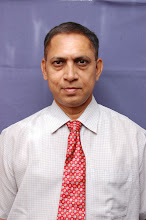In this materialistic world of stress and
strife, one loses track of Spirituality. Man leads a life of ignorance without
realizing his own Self. It is very important that sooner or later one moves
from being ritualistic to being a spiritual person for his own well being.
Religion teaches us the way of Life (How to
live). You can do Karma yoga and Upasana yoga for performing religious
activities.
Spirituality tells us the purpose of Life,
through Self-enquiry and Self-analysis. Man’s purpose is to attain Moksha or
Liberation, which is possible if one becomes spiritual. This requires Jignasu
Bhakthi which is a bhakthi without any motive, or expectation.
In the seventh chapter of Bhagavad Gita,
Krishna tells Arjuna that four kinds of virtuous men (Bhakta) worship him. They
are, the distressed (Aarta Bhakti), the seeker of wealth (Ardharthi Bhakti),
the seeker of knowledge (Jignasu Bhakti) and the wise (Gnani Bhakta), who are
men of knowledge and have attained self illumination. Aarta and Ardharthi are
religious and also materialistic people. They use religion only for contract with
God Viz., for getting success in worldly ventures; they use Bhakti for non-spiritual
purposes. We give another name for this as ‘Sagama Bhakti’.
Krishna says that everyone who begins with Sagama
Bhakti must develop Spiritual Bhakti also called Nishkama Bhakti.
Nishkama Bhakti has 3 stages. Karma yoga
stage, Upasana yoga (meditation) and Gnana yoga. Gnana yoga stage of Nishkama
bhakti includes a continuous and systematic study of vedantic scriptures for a
length of time under a Guru who himself has practiced the same. By doing
Nishkama/ jignasu Bhakti you will get Gnana Bhakti. Lord Krishna says among all
the 4 bhakti, Gnana Bhakti is the greatest of all.
Sagama Bhakti is for Materialistic purpose
and Nishkama Bhakti is for Spiritualistic purpose.
Four differences associated with Sagama and
Nishkama Bhakti are outlined.
1.
Sagama
Bhakti is deity specific (doing pooja for material purpose). Nishkama Bhakti is
not deity specific. You can worship any deity and seek spiritual growth
2.
Sagama
Bhakti is ritual specific. Nishkama Bhakti is ritual non-specific. In Sagama
Bhakti many rules and regulations are followed while performing a ritual. For Nishkama
Bhakti your motive alone is important. You do pooja with whatever is available.
3.
Sagama
Bhakti has doubtful results. Nishkama Bhakti has definite result as you think
of the Lord only.
4.
Even
if Sagama bhakti is successful and gives expected result, it is going to be
finite in nature. Eg. Money, position, relation, possession etc., is perishable
making you miserable when it perishes. Nishkama Bhakti will give Spiritual
Growth, which is permanent. That is moksha. Moksha is stable. Even God cannot
take away moksha once attained (Brigadaranyaka Upanishad). We should have Sagama
Bhakti, Nishkama Bhakti Viveka (differentiation).
A person practicing Nishkama Bhakti is always
happy, own nothing; believes in self and possesses good values. Have faith in yourself.
We have great Mahatmas in our culture. They own nothing and they possess
nothing. They take Bhikcha (alms) only from others for their living. However, they
say, “I am perfectly poornam (fulfilled)”.
We have to practise good values. The most
important is the dilution of Raga Dvesha (likes and Dislikes). Anything is easy
if you prepare your mind.
A person who has Nishkama Bhakti will know
Eswara. At the time of death, he will remember Eswara only.
Being religious is being materialistic with
expectations. Being spiritual is being Spiritualistic (doing Gnana yoga)
without any expectations.
Life is a blessing for a Sanyasi, who is a
spiritual person.
Life is a burden for a Samsari, who is a
materialistic person.
By moving from:
Being ritualistic to becoming spiritualistic
From doing Karma yoga to gaining Gnana yoga
Expectations to Fulfillment
Being Rajasic to becoming Satvic.
One attains Self - realization.
S.Sekar
Email: sekrajc@yahoo.com
